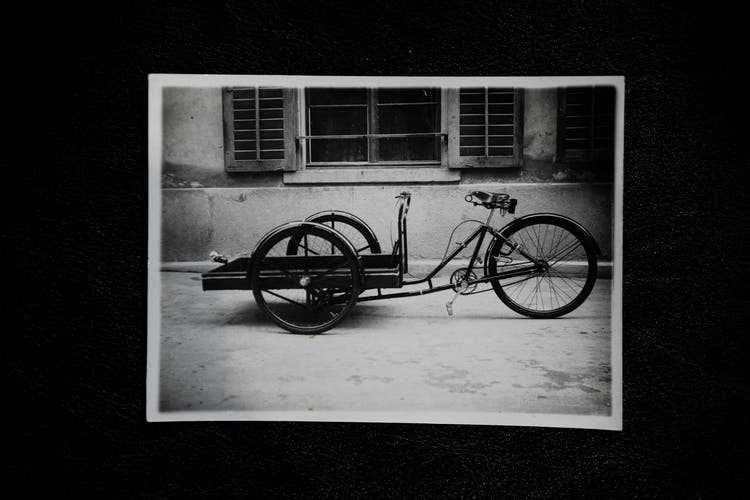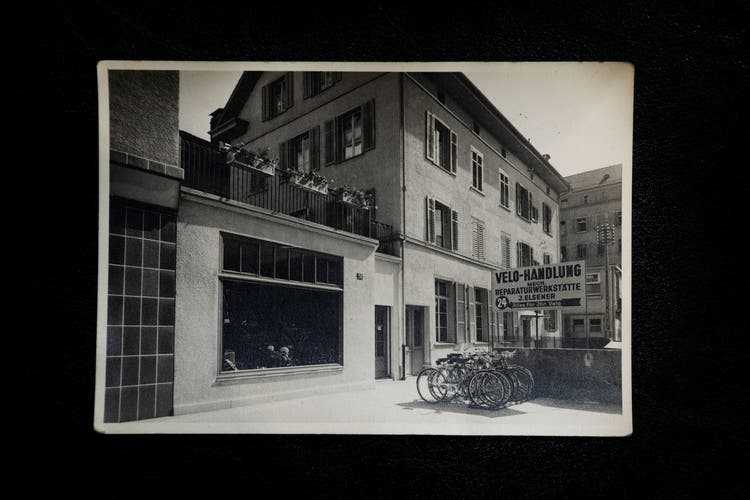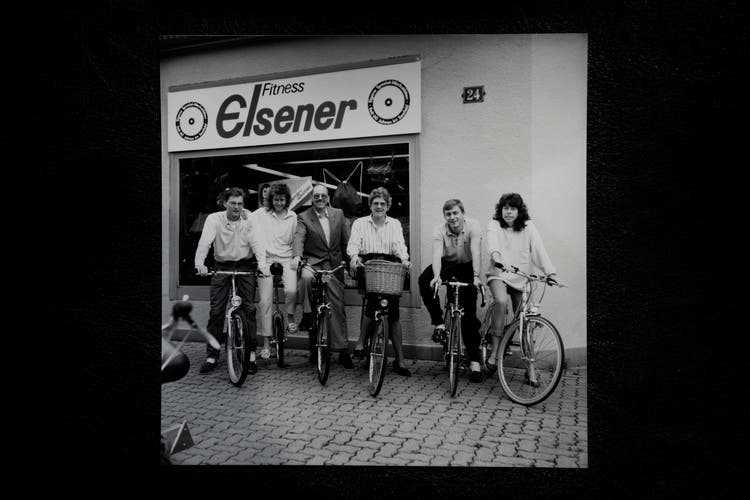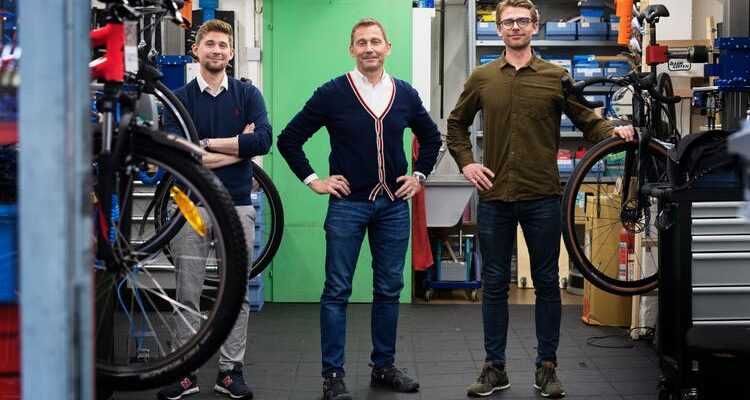The fourth generation is at the start of the Elsener bicycle shop. However, online trading creates uncertainty.
Christian Elsener with his sons Jan (left) and Marc in the bike workshop.
When Christian Elsener did his apprenticeship at the end of the 1970s, he could not have guessed that one day a bicycle service would include loading the latest software onto the vehicle. His specialist shop on Seefeldstrasse, not far from the opera house, is also benefiting from the boom in e-bikes. However, the general digitization also darkens the perspective. But of that later.
In the shop and workshop there is a lot of coming and going in the middle of the afternoon on weekdays. Business is good. The bicycle industry is a male domain, at least that’s what it seems on the ground floor. However, one employee recently became self-employed and is looking for female support. And one floor up, the owner’s two sisters take care of the administration in job sharing.
Velo Elsener is a typical family business. The fourth generation is now working with the two sons. Elsener says it was always clear to 29-year-old Marc, a trained bicycle mechanic with a trade school, that he wanted to get into the business. Jan, who is two years younger, trained as a logistician and has only been working with the company since last summer. He is a born salesman, says his father about him. The junior didn’t want to admit that for a long time. Now he likes the task.
Elsener will soon be 60, wants to step down gradually from next year and gradually hand over responsibility. “Of course it’s a challenge,” he says and laughs. He himself was able to take over the business from his father alone.
At times, motorbikes and mopeds are also sold
Velo Elsener is celebrating its 100th anniversary this year. In July 1922, Christian’s grandfather, the locksmith Joseph Elsener, opened a workshop for frame construction on Hallenstrasse in district 8. A specialty were his racing handlebars, which some early Swiss cycling champions raced with and which were also sold at the Six Days in New York and Chicago.

Cargo bikes existed before that: Joseph Elsener constructed this model around 1940, perhaps because fuel was rationed during the war.
After a good ten years, Elsener acquired the property at Seefeldstrasse 24, which has served as a workshop since 1934, from his neighbor, the carpenter and later building contractor Ernst Göhner. With Paul Elsener, the second generation took over the business in 1958. It was the time when you couldn’t make a living from the bike shop alone. That’s why he expanded the range to include motorcycles and mopeds.
He also diversified by founding the wholesale trade Famo (of bicycles and motorcycles) in 1967 and selling spare parts and accessories. His son Christian remembers how, as a schoolboy, he packed nozzles for Velosolex to earn some pocket money. This company later passed to his brother.

The Elsener store on Seefeldstrasse around 1960.
Christian Elsener did his apprenticeship as a bicycle and motorcycle mechanic. Even before he finally took over the business in 1993, he dissolved the motorcycle and moped department. Elsener speaks of an affair of the heart. You could do more with bicycles than with motorbikes, even build a two-wheeler yourself.
In addition, there was hardly enough space in Zurich for mixed shops. And of course: an inveterate cyclist doesn’t like the smell of petrol in the shop, and a seasoned motorcyclist doesn’t like when he has to squeeze past bikes. You had to choose one of the two.
Anchored in the district
Today, Elsener is not only the oldest bicycle shop in the city of Zurich, it is also one of the largest family businesses in this branch with a total of twelve employees. “People drive to work in the city center in the morning and come to see us,” is how Christian Elsener describes the business model. This includes bringing the bike in for repairs in the morning and picking it up the same day.
Is that possible in the long term in Seefeld? The business is almost entirely on its own property, says Elsener. But he pays a fair rent to his three siblings. The owner knows the bike business better than almost anyone else, is networked in the Zweirad Schweiz branch association, in the Seefeld trade association and is an expert in final apprenticeship exams.

The Elsener family business: parents Helen and Paul in the middle, son Ruedi (left), daughters Monika and Ursula (right) and next to her on the racing bike today’s owner Christian Elsener.
The new competition from big players in the market such as Migros’ Bike World with its megastores in the agglomerations is not causing the greatest concern. You can’t put a shop with this area in Seefeld, says Elsener. Free riders, who sell bicycles as well as T-shirts, wine or books, appeared after the boom in mountain bikes and the hype with scooters and quickly disappeared again.
The traditional bicycle shop is close to the people in two ways: due to its location in the district and due to its regular customer base. It happens that an older gentleman buys a bike for his grandchild and says he just got his first two-wheeler from Elsener.
However, Corona threw everything upside down. The pandemic was both an opportunity and a threat. The people could do little and were looking for exercise. Elsener remembers the Saturday when he was allowed to reopen the shop after the first lockdown in 2020. From morning to evening there was a queue in front of the door, you weren’t allowed to let in too many customers. Everyone would have bought a bike, not just looked around.
Sales migrate to the Internet
At the same time, online trading experienced an enormous upswing in this sector as well. This is already clearly noticeable in clothing, which is being bought less and less in stores. The once extensive range in the store has shrunk. Elsener is now considering giving up this area entirely.
The sale of the bikes is also not guaranteed in the long term. The trend is towards “click and collect”: things are ordered online and picked up from the retailer. This then only leaves a small part of the margin. According to Elsener, more and more bicycles, until now rather cheap models without an electric drive, are being pre-assembled and delivered to your home with instructions for assembly. Expensive models starting at 7,000 francs have recently been partially assembled by suppliers at the customer’s site.
It’s important to work with brands that don’t ignore the bicycle dealer, says Elsener. He has been relying on the Californian manufacturer Specialized for a long time. Its founder once said that nothing would work without human power. Now he too has had e-bikes in his range for over ten years.
The bicycle boom is likely to continue even after the pandemic. Normal bicycles will increasingly be replaced by light e-bikes, predicts Christian Elsener, who himself likes to ride the e-mountain bike in the hills. “Velo” comes from the Latin word for speed. It’s about mobility. “We were always mobile,” says the bike dealer in Seefeld and is confident about the future.
Velo Elsener has just updated the workshop technically and will soon have it certified. If part of the sale should be lost: two-wheelers need maintenance, not just the latest software. There is always something that needs to be repaired, which we are happy to leave to a professional with confidence.
